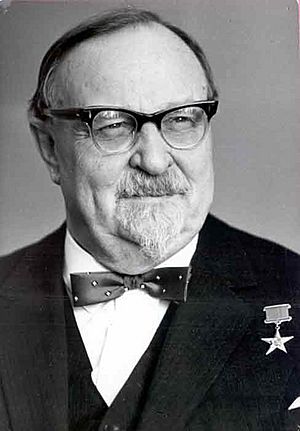Alexander Oparin facts for kids
Quick facts for kids
Alexander Oparin
|
|
|---|---|

Oparin in the mid-1970s
|
|
| Born | March 2, 1894 Uglich, Russian Empire
|
| Died | April 21, 1980 (aged 86) |
| Alma mater | Moscow State University |
| Known for | Contributions to the theory of the origin of life coacervates |
| Awards | Hero of Socialist Labour (1969) Lenin Prize (1974) Kalinga Prize (1976) Lomonosov Gold Medal (1979) |
| Scientific career | |
| Fields | Biochemistry |
| Institutions | Moscow State University USSR Academy of Sciences |
Alexander Ivanovich Oparin (Russian: Александр Иванович Опарин; March 2, 1894 – April 21, 1980) was a Soviet biochemist. He is most famous for his ideas about how life began on Earth. He wrote an important book called The Origin of Life. Oparin also studied how plants process materials and how enzymes work inside plant cells. He showed that many food production methods use natural chemical helpers. These helpers are called biocatalysts. He helped start the field of industrial biochemistry in the Soviet Union.
Contents
Life and Work
Alexander Oparin was born in Uglich in 1894. He finished his studies at Moscow State University in 1917. By 1927, he became a professor of biochemistry there. Early in his career, he wrote many papers about plant enzymes. These enzymes play a big role in how plants use energy, a process called metabolism.
In 1924, Oparin suggested a new idea. He thought that life on Earth started slowly. It began with a gradual chemical evolution. This happened with carbon-based molecules. These molecules were in what he called the "Earth's primordial soup". This "soup" was the early oceans filled with chemicals.
In 1935, Oparin helped create the Biochemistry Institute. This was part of the Soviet Academy of Sciences. He became a full member of the Academy in 1946. During the 1940s and 1950s, he supported some ideas that were popular at the time. These ideas claimed that cells could form from non-living matter. Following the official views of the time helped his career.
In 1970, Oparin was chosen to lead a big international group. This group studied how life began. He passed away in Moscow on April 21, 1980. He was buried in the Novodevichy Cemetery in Moscow.
Oparin received many honors for his work. He was named a Hero of Socialist Labour in 1969. He won the Lenin Prize in 1974. In 1979, he received the Lomonosov Gold Medal. This award was for his amazing work in biochemistry. He also received the Order of Lenin five times.
Oparin's Theory of Life's Beginning
Oparin was very interested in how life first appeared. He looked at different ideas, like panspermia. This idea suggests life came to Earth from space. But Oparin focused on how life could start right here.
In 1922, he shared his main ideas:
- He believed there was no basic difference between living and non-living things. Life's complex features must have grown from the evolution of matter itself.
- Scientists had found methane in the atmospheres of planets like Jupiter. Oparin thought early Earth had a special atmosphere. It was a "reducing atmosphere". This means it had gases like methane, ammonia, hydrogen, and water vapor. He believed these were the basic ingredients for life to start.
- Oparin thought that simple solutions of organic matter formed first. These were just chemicals following basic rules. But over time, molecules grew more complex. They started forming new structures. These structures were like tiny droplets. They had new properties.
- This process led to biological order. Oparin believed that competition and survival played a role. The best-suited forms of these early structures would survive. This led to the complex living things we see today.
Oparin explained how basic organic chemicals could form tiny systems. From these systems, simple living things might have developed. He mentioned research on coacervates. These are tiny droplets that form naturally in solutions. Oparin thought different types of coacervates could have formed in Earth's early oceans. Then, a selection process would have led to life.
Oparin himself could not do experiments to test his ideas. But later scientists did. In 1953, Stanley Miller tried an experiment. He wanted to see if chemicals could organize themselves on early Earth. The Miller–Urey experiment used heat and electric sparks. These sparks were like lightning. He put simple gases like those Oparin suggested into a sealed system. After a short time, many common organic compounds formed. These included amino acids, which are the building blocks of proteins. The compounds that formed were more complex than the starting materials. This experiment supported Oparin's ideas.
How Ideas Influenced Oparin's Theory
Oparin's ideas about life's origins fit well with the official views of the time. The idea of gradual change and evolution was seen as a "dialectical unity." This means things develop through a process of change and interaction. This way of thinking supported Oparin's ideas.
See also
 In Spanish: Aleksandr Oparin para niños
In Spanish: Aleksandr Oparin para niños
- Abiogenesis
- Biochemistry
- List of independent discoveries ("Primordial soup" theory of the origin of life from carbon-based molecules, 1924)
- Microsphere
- Oparin Medal
- Proteinoid
- Sidney W. Fox
- Stanley Miller

